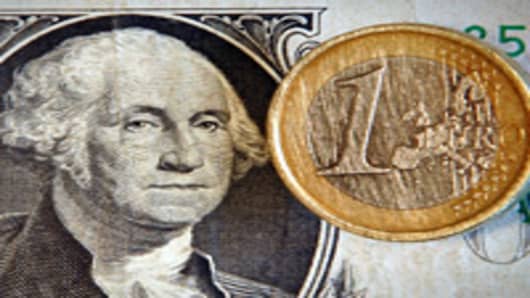European finance ministers are squabbling like the U.S. Congress, but it's not going to get in the way of a rising euro.
At least, that's the view of Paul Mackel, head of Asia currency research at HSBC.
"We think the euro is still going to remain resilient," he told CNBC. "Ultimately I think this currency is going to stay stronger than most people think."
Admittedly, a big part of that will be a byproduct of dollar weakness, Mackel says. "The dollar is probably going to move into more of a weakening environment. It's not so much that we like the euro for anything good that's going on in the euro zone."
There is the small matter of economic weakness, and more than a little political drama ahead.





